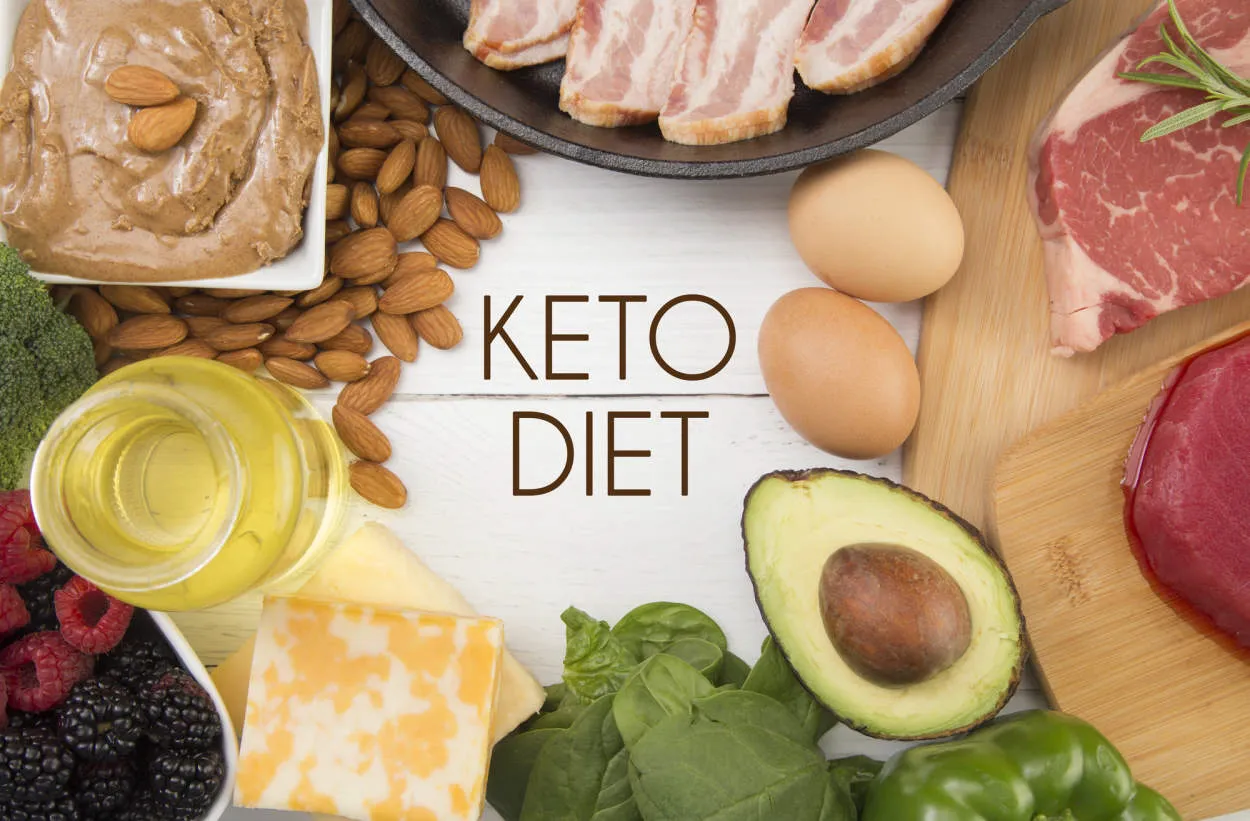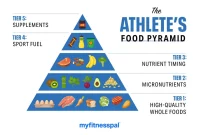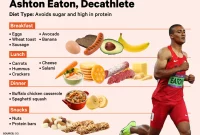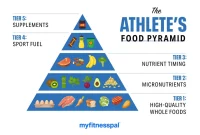The ketogenic diet is gaining popularity among athletes looking for an effective way to maximize their performance. This comprehensive guide explores the benefits, potential drawbacks, and important considerations when following a ketogenic diet as an athlete.
Understanding the Keto Diet in Sports
The ketogenic diet, commonly known as the keto diet, has gained popularity among athletes seeking to optimize their performance and body composition. This comprehensive guide will provide you with a deeper understanding of how the keto diet can be utilized in sports.
What is the Keto Diet?
The keto diet is a low-carbohydrate, high-fat, and moderate-protein eating plan. By significantly reducing carbohydrate intake and increasing fat consumption, the body enters a metabolic state called ketosis. In ketosis, the body primarily utilizes fat for fuel instead of carbohydrates.
Benefits for Athletes
The keto diet has been used by athletes to enhance endurance, promote fat loss, and improve mental clarity. When the body becomes keto-adapted, it becomes efficient at burning fat for prolonged periods, making it an attractive approach for endurance athletes.
Additionally, the keto diet may aid in weight loss as it promotes ketosis, where fat stores are utilized for energy. This can be beneficial for athletes looking to reduce body fat while preserving muscle mass.
Possible Drawbacks
While the keto diet can be beneficial for some athletes, it may not be suitable for everyone. Some individuals may experience initial side effects such as fatigue, decreased performance, and difficulty with high-intensity workouts due to the body’s adaptation to using fat as the primary fuel source.
Considerations for Athletes
Athletes considering the keto diet should carefully plan their nutrient intake to ensure adequate protein and micronutrient consumption. It is advisable to consult with a qualified nutritionist or dietitian to tailor the diet to individual needs and optimize athletic performance.
Conclusion
In conclusion, understanding the keto diet in the context of sports can provide athletes with another tool to explore for optimizing performance and body composition. However, it is crucial to approach any dietary changes with careful consideration and personalized guidance to ensure the diet aligns with individual goals and needs.
Benefits and Challenges of Keto for Athletes
The ketogenic diet, or keto diet, has gained popularity among athletes for its potential benefits in optimizing performance and body composition. However, it also poses certain challenges that athletes need to be aware of. In this article, we will explore both the benefits and challenges of implementing a keto diet for athletes.
Benefits:
1. Enhanced Fat Burning: The keto diet emphasizes high-fat, moderate-protein, and low-carbohydrate intake. By significantly reducing carbohydrate intake, the body is forced to burn stored fat for energy. This can lead to increased fat burning, which may be beneficial for athletes looking to improve body composition and reduce body fat levels.
2. Stable Blood Sugar Levels: By minimizing carbohydrate intake, the keto diet can help regulate blood sugar levels. This can result in improved energy levels and better endurance during workouts, as athletes experience fewer fluctuations in blood sugar.
3. Mental Clarity and Focus: Many athletes report improved mental clarity and focus while following a ketogenic diet. This may be attributed to the stable blood sugar levels and the use of ketones as a source of energy for the brain.
Challenges:
1. Adaptation Phase: When starting a keto diet, athletes may experience an adaptation phase commonly known as the “keto flu.” This phase can cause temporary symptoms such as fatigue, brain fog, and decreased exercise performance. Patience and gradual adjustment of macronutrient intake can help minimize these effects.
2. Reduced Glycogen Stores: Carbohydrates are the primary fuel source for high-intensity exercise. The limited carbohydrate intake on a keto diet can result in reduced glycogen stores, which may impact performance in activities that require quick bursts of energy, such as sprinting or weightlifting.
3. Nutrient Deficiencies: The restrictive nature of the keto diet can make it challenging to obtain an adequate intake of certain nutrients, such as fiber, vitamins, and minerals. Athletes following a keto diet should carefully plan their meals to ensure they meet their nutrient needs.
In conclusion,
the ketogenic diet can offer benefits for athletes, including enhanced fat burning, stable blood sugar levels, and improved mental clarity. However, it is important to consider the challenges, such as the adaptation phase, reduced glycogen stores, and potential nutrient deficiencies. Individual athletes should evaluate their specific goals and consult with a healthcare professional or registered dietitian before adopting a ketogenic diet.
Meal Planning for a Ketogenic Athlete
Following a ketogenic diet as an athlete requires careful meal planning to ensure optimal performance and fueling for workouts. Here are some key considerations for meal planning:
1. Focus on High-Quality Fats
In a ketogenic diet, fats become the primary source of energy. It’s important to choose healthy fats such as avocados, nuts, seeds, and olive oil. These provide essential nutrients and support overall health.
2. Prioritize Adequate Protein Intake
Protein is essential for muscle repair and recovery. Include moderate portions of high-quality protein sources like lean meats, fish, eggs, and tofu. This helps maintain muscle mass and supports athletic performance.
3. Include Low-Carb Vegetables
Low-carb vegetables like leafy greens, broccoli, cauliflower, and zucchini are packed with fiber, vitamins, and minerals. They add volume to meals and help meet nutrient requirements while keeping carbohydrate intake in check.
4. Plan for Electrolyte Balance
When following a ketogenic diet, it’s important to maintain electrolyte balance. Include foods rich in electrolytes like sodium, potassium, and magnesium. Avocados, leafy greens, and nuts are good sources.
5. Stay Hydrated
Adequate hydration is crucial for athletes. Drink plenty of water throughout the day to support overall health, digestion, and exercise performance.
6. Consider Timing of Carbohydrates
Some athletes choose to include targeted carbohydrates around workouts to enhance performance. This involves consuming a small amount of carbs before or after intense training sessions.
7. Plan Ahead and Meal Prep
To stay on track with your ketogenic diet, it’s helpful to plan your meals in advance and do some meal prep. This ensures that you have appropriate food options available and can avoid reaching for unhealthy choices.
8. Listen to Your Body
Everyone’s nutritional needs are unique, so it’s essential to listen to your body. Pay attention to how different foods and meal timing affect your energy levels and performance. Adjust your meal plan accordingly.
Following a ketogenic diet can be a viable option for athletes seeking improved body composition and endurance. Consult with a registered dietitian or sports nutritionist to personalize your meal plan based on your specific goals and needs.
Keto-Friendly Recipes for Sports Performance
When following a ketogenic diet for sports performance, it is crucial to fuel your body with the right foods. This article provides a selection of keto-friendly recipes to support athletes in their athletic endeavors.
1. Avocado and Bacon Salad
This refreshing salad combines nutrient-dense avocado with crispy bacon. It provides a good source of healthy fats and protein to keep you energized throughout your workout.
2. Grilled Chicken with Broccoli
A grilled chicken breast paired with steamed broccoli is a classic keto-friendly combination. It offers high-quality protein and essential vitamins and minerals that aid in muscle recovery and growth.
3. Salmon and Asparagus Foil Packs
These foil packs are not only easy to make but also packed with omega-3 fatty acids and micronutrients. The combination of salmon and asparagus offers anti-inflammatory properties that can enhance post-workout recovery.
4. Cauliflower “Rice” Stir-Fry
Replace traditional rice with cauliflower “rice” for a low-carb stir-fry. Add your choice of lean protein, such as chicken or tofu, along with a variety of colorful vegetables for a complete and satisfying meal.
5. Greek Yogurt Parfait
This keto-friendly dessert option combines Greek yogurt with berries and a sprinkle of nuts or seeds. It is rich in protein and healthy fats, making it a great post-workout treat that supports muscle repair and growth.
Conclusion:
Incorporating these keto-friendly recipes into your diet can provide the necessary nutrients for optimal sports performance. However, consulting with a nutritionist or dietician is recommended to ensure your individual needs are met.
Monitoring and Adjusting Your Keto Diet
Following a ketogenic diet as an athlete requires careful monitoring and adjustments to ensure optimal performance and health. Here are some essential strategies to consider:
1. Tracking Macros:
Monitoring macronutrient intake, specifically fat, protein, and carbohydrates, is crucial in a ketogenic diet. Keeping a daily record can help maintain the desired macronutrient ratios.
2. Measuring Ketone Levels:
To ensure you are in a state of ketosis, regularly measure your ketone levels using blood, urine, or breath testing kits. This will help gauge the effectiveness of your diet.
3. Adjusting Carbohydrate Intake:
Athletes may require different levels of carbohydrates depending on their training intensity and goals. Experiment with adjusting carb intake while staying within the ketogenic guidelines.
4. Adequate Protein Intake:
Protein is important for muscle repair and growth. Ensure you are consuming sufficient protein while staying within your recommended daily intake to prevent muscle wasting.
5. Hydration:
Staying hydrated is vital for any athlete. Be sure to drink plenty of water and consider adding electrolytes to replenish minerals lost through ketosis.
6. Monitoring Energy Levels:
Pay attention to your energy levels during workouts and adjust fat intake if necessary. Some athletes may benefit from higher fat consumption, while others may require more carbohydrates for added energy.
7. Seeking Professional Guidance:
If you are new to the ketogenic diet or have specific performance goals, it is beneficial to consult with a registered dietitian or a sports nutritionist who can provide personalized guidance.
Remember, monitoring and adjusting your keto diet is essential to ensure it aligns with your athletic needs and goals. Keep track of your progress and make necessary changes to optimize performance and overall well-being.
Conclusion
The ketogenic diet can be a beneficial strategy for athletes looking to improve their performance and body composition. By shifting the body’s primary fuel source from carbohydrates to fats, athletes can tap into their stored fat reserves for fuel, leading to increased endurance and faster recovery. However, it is essential to work with a qualified professional to ensure proper nutrient intake and avoid any potential risks or deficiencies.




